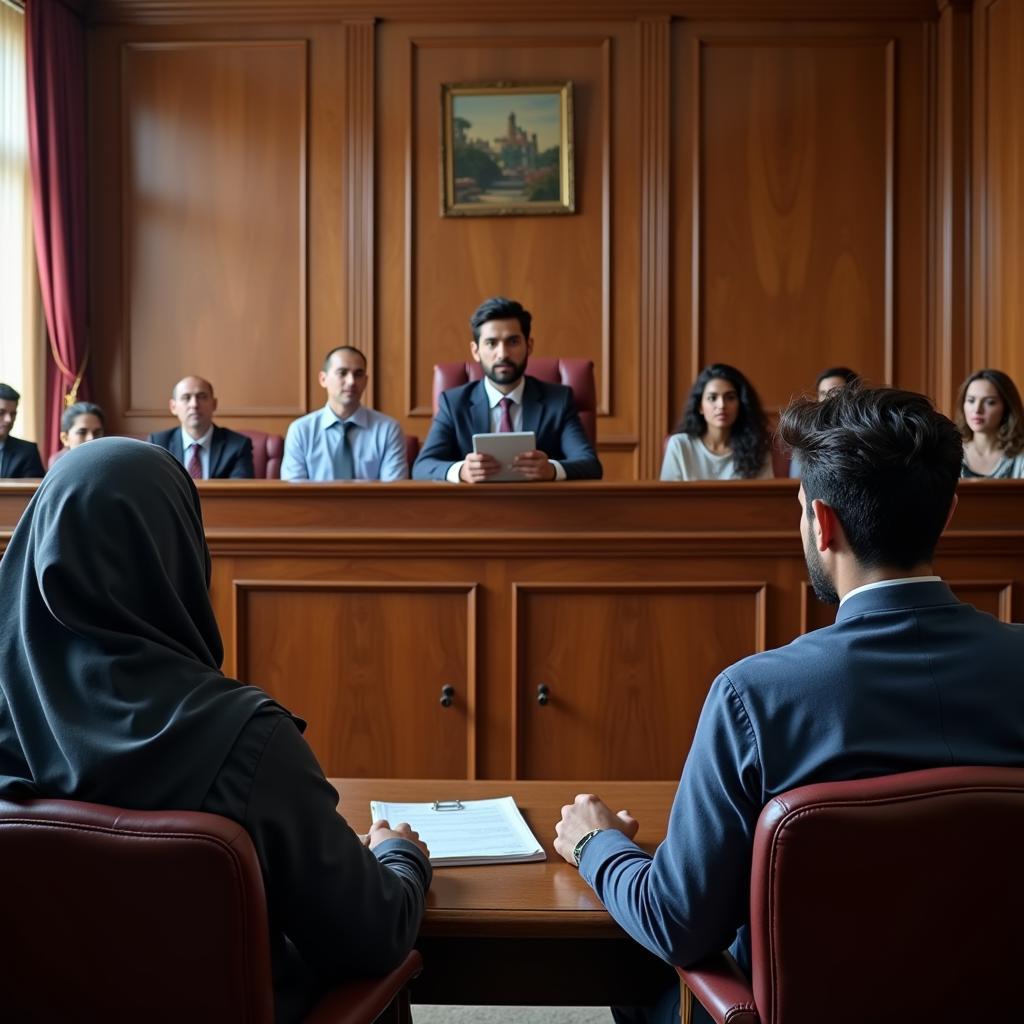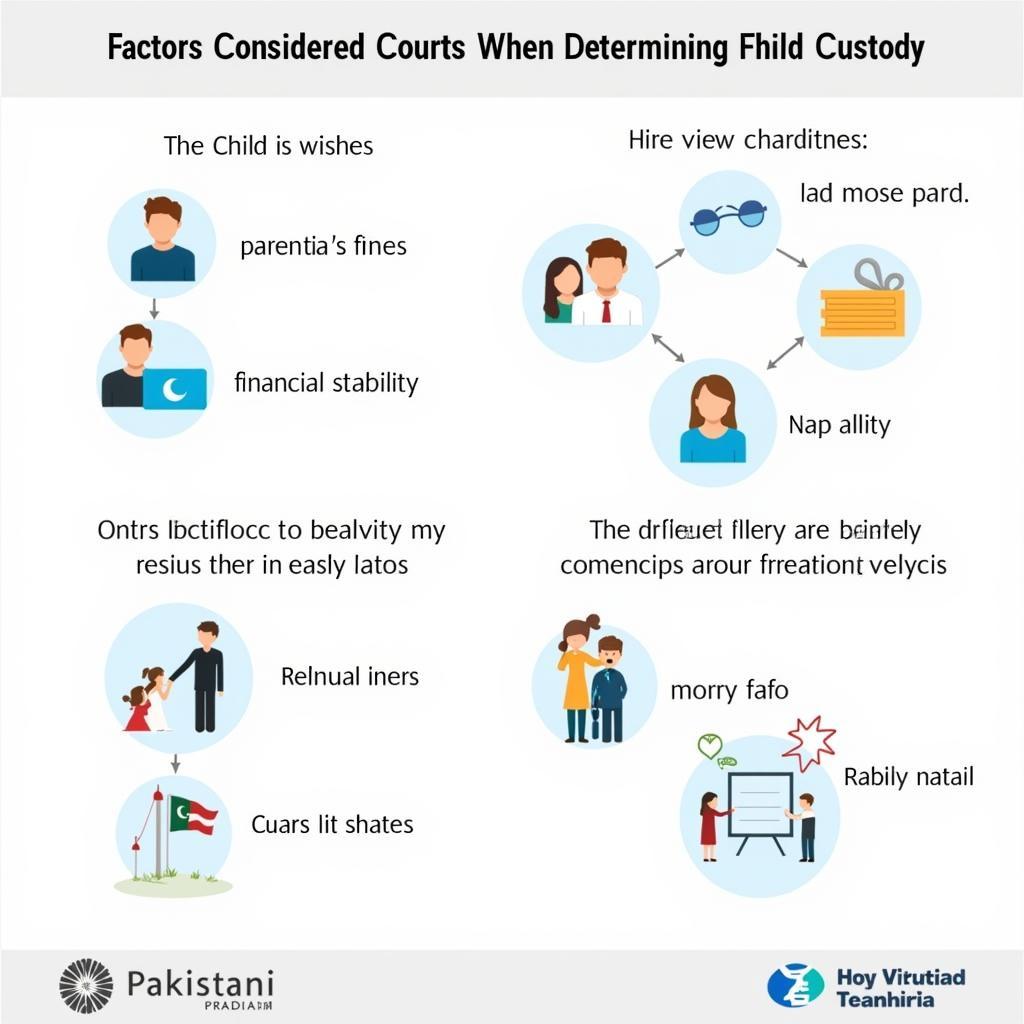Navigating Child Custody After Divorce In Pakistan can be a complex and emotionally charged process. This guide provides valuable insights into the legal framework, procedures, and factors influencing child custody decisions in Pakistan.
 Child custody proceedings in a Pakistani court
Child custody proceedings in a Pakistani court
Understanding the legal landscape surrounding child custody after divorce in Pakistan is crucial for both parents. Islamic law, specifically the concept of Hizanat, plays a significant role, granting mothers preferential custody rights for young children, particularly daughters. However, fathers retain guardianship and financial responsibility. Modern Pakistani law also considers the child’s welfare as paramount, taking into account factors such as the child’s age, health, and emotional well-being. Courts aim to make decisions that are in the best interests of the child, even if it deviates from traditional Hizanat principles. You might also want to learn more about filing for divorce notice sample in pakistan.
Understanding Hizanat and its Modern Interpretation
Hizanat traditionally grants the mother custody of young children until a certain age, usually seven for boys and puberty for girls. However, the mother’s right to Hizanat can be challenged if she is deemed unfit, such as in cases of remarriage to a non-mahram (a man she is permitted to marry under Islamic law), neglect, or immoral conduct. Modern interpretations of Hizanat increasingly emphasize the child’s best interests, allowing for greater flexibility in custody arrangements. For more information on legal proceedings, see our resource on appeal against family court order in pakistan.
What factors influence child custody decisions?
Several factors influence child custody decisions in Pakistan. The child’s wishes, if they are of sufficient age and understanding, are given weight. The court also considers the living arrangements, financial stability, and emotional support each parent can provide. The ability of each parent to foster a healthy relationship between the child and the other parent is also a crucial factor.
 Factors considered in child custody cases in Pakistan
Factors considered in child custody cases in Pakistan
Navigating the Legal Process
The legal process for child custody after divorce in Pakistan typically involves filing a petition with the Family Court. Both parents present their cases, and the court may appoint a guardian ad litem to represent the child’s interests. Evidence, including witness testimonies and documentation, can be presented. The court then issues a custody order outlining the terms of custody, visitation, and child support. Understanding the intricacies of law subjects in pakistan can be beneficial during this process.
How can I prepare for a child custody case?
Preparing for a child custody case requires meticulous documentation and a clear understanding of your rights and responsibilities. Gathering evidence that supports your claim, maintaining a positive parenting record, and seeking legal counsel are essential steps.
“In child custody cases, preparation is paramount,” says renowned family lawyer, Barrister Ayesha Khan. “Thorough documentation and a clear understanding of the legal framework can significantly impact the outcome.”
Joint Custody and Visitation Rights
Joint custody, although less common in Pakistan, is becoming increasingly accepted. It allows both parents to share legal and physical custody of the child. Visitation rights are typically granted to the non-custodial parent, ensuring they can maintain a relationship with the child. The court determines the frequency and duration of visits based on the child’s best interests. Consider researching divorce papers in pakistan pdf for more detailed information.
Conclusion
Child custody after divorce in Pakistan is a complex issue governed by both traditional Islamic principles and modern legal considerations. Understanding the legal framework, preparing adequately for court proceedings, and prioritizing the child’s well-being are essential for navigating this challenging process. Remembering the best interests of the child is key to achieving a positive outcome in child custody disputes. The importance of focusing on the child’s welfare is echoed by Dr. Fatima Ali, a leading child psychologist: “Prioritizing the child’s emotional and psychological well-being is crucial during and after divorce proceedings.”
FAQs
- What is the role of Hizanat in child custody cases?
- How does a court determine the best interests of the child?
- What are the visitation rights of the non-custodial parent?
- Can joint custody be awarded in Pakistan?
- What documents are required for a child custody case?
- How long does a child custody case typically take?
- What are the options for appealing a child custody order?
Looking for information about the legal field in Pakistan? Explore our article on llb subjects list in pakistan.
For assistance with child custody matters, contact us at +923337849799, email us at news.pakit@gmail.com, or visit our office at Dera Ghazi Khan Rd, Rakhni, Barkhan, Balochistan, Pakistan. Our customer service team is available 24/7.